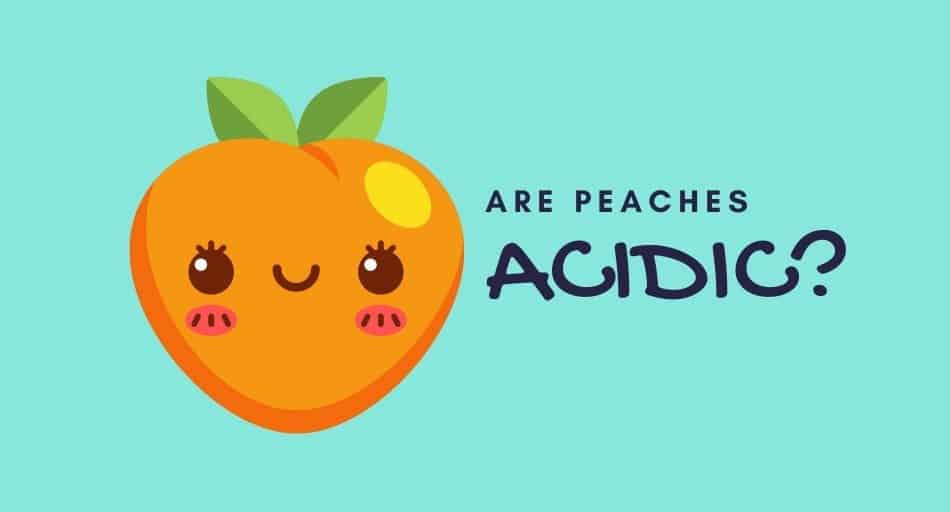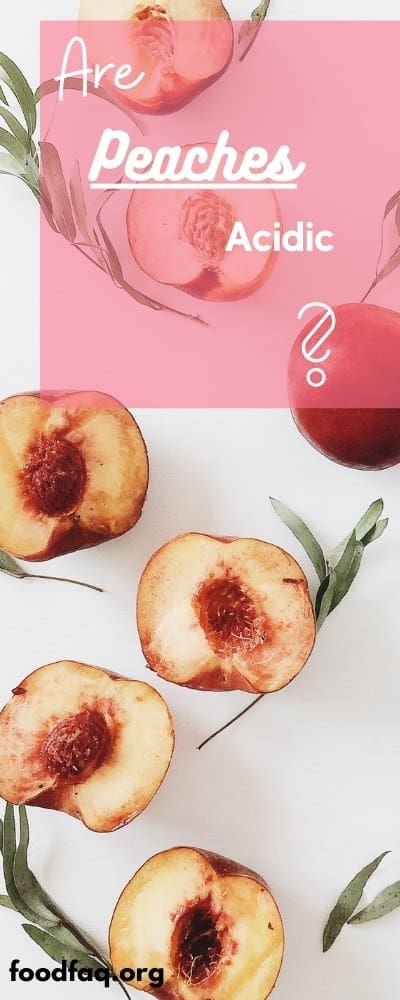Peaches are a really delicious fruit that we all know and love. They're juicy, tasty, and also packed with essential nutrients. However, even though they taste sweet, they containing citric acids, which may not be good for people struggling with certain conditions, such as acid reflux.

Table of Contents
Are peaches acidic?
Peaches are slightly acidic, but it's not enough to trigger any painful acid reflux symptoms. They also contain a number of vital vitamins, minerals, and nutrients that can boost your immunity and help prevent acid reflux in the future.
What is the pH level of peaches?
The ph level of peaches ranges between 3.4-3.6. This means that they're slightly acidic but safe to consume by people following an alkaline diet or those struggling with acid reflux or GERD. This makes peaches a good fruit to snack on as they won't exacerbate the symptoms.
As a rule, foods with a pH level below 4.6 are considered acidic, which means that peaches fall into that category. However, this fruit is on the higher end of this scale, and it's also rich in many neutralizing minerals. Therefore, peaches are relatively safe to consume for everyone.
Nonetheless, it's important to remember that everything is good in moderation, and what works for someone else might not work for you.
How healthy are peaches?
Peaches are very nutritious and rich in many minerals. They aren't too high in calories, containing about 54 calories (one medium-sized peach).
The majority of these calories come from carbohydrates, so peaches are incredibly low in fat. Fat is known to make acid reflux worse since it slows digestion down, forcing stomach acids up the esophagus. Hence, consuming foods low in fat is a good option.
In addition, peaches are high in vitamin C. This micronutrient is essential in boosting immunity as well as speeding up the wound healing process. It's also beneficial for teeth and skin health, promoting elasticity and preventing acne.
Additionally, vitamin C helps prevent iron deficiency by improving iron absorption.
Moreover, peaches help in digestion due to their fiber content. This carb is also helpful in treating acid reflux and GERD symptoms. Fiber absorbs excess stomach acid, which prevents it from rising your esophagus. As a result, it's essential to include a lot of fiber-rich foods in your diet.
Like most fruit, peaches provide a lot of plant compounds and antioxidants that may help prevent cancer. Antioxidants help remove free radicals from your body, stopping cell damage before it even occurs.
On the other hand, plant compounds may help prevent heart diseases and high blood pressure.

Are peaches bad for acid reflux and GERD?
Peaches are slightly acidic, but they don't tend to cause acid reflux. Furthermore, they contain important nutrients that can help heal your gut, preventing excess stomach acid from accumulating.
Nevertheless, they're still relatively acidic produce, which means that they should be consumed in moderation, especially by people already experiencing heartburn and other acid reflux symptoms.
Many people see improved gut health when they consume slightly acidic foods since they all contain essential nutrients. Peaches are part of this group, so having some of this healthy fruit is a good idea — provided that you tolerate them.
Is peach juice acidic?
It takes a lot more peaches than you would normally eat to make peach juice. This means that it's best to avoid peach juice or drink it in small quantities if you're particularly sensitive to acidic foods. Nevertheless, just like peaches, peach juice is healthy and rich in vitamins and antioxidants.
So if you're able to tolerate it without worsening your acid reflux symptoms, it's a good idea to have some every once in a while.
Peach juice has a pH level of around 3.3-4.0 — around the same as fresh peaches. If you're keen on trying to add peach juice to your diet, make sure to opt for either freshly squeezed or organic juice. That way, you can be sure that there are no additives that can lower the pH level and negatively impact your health.
Furthermore, consuming organic and ecological produce means that you don't have to worry about pesticides. However, make sure to wash your fruit and veggies anyway.
What's more, peach juice has been proven to lower blood pressure due to the antioxidants it contains. To reap this health benefit, it's best to invest in a juicer so that you can use the whole peach and make the juice yourself.
Thanks to that, you will not only know what you're consuming, but you'll also be able to make more juice and store it for later. Despite all this, remember that juices are high in calories and sugars, so don't overdo it. Consuming too many sugary drinks can worsen your heartburn and acid reflux.
Are canned peaches acidic?
Canned peaches, especially store-bought, are slightly higher on the pH scale, ranking at 3.70-4.20. This number varies depending on the method of canning and added ingredients. As a result, if you like canned peaches but you're worried about their acidity, you can try canning them yourself. That way, you'll avoid increasing their acidity.
Canned peaches come with relatively the same health benefits as their fresh counterparts, but they have a lot more sugar. Often, sugar is added in the canning process, and sugary foods aren't good for people struggling with acid reflux or GERD.
This is because sugar is high to digest and stays in your stomach longer, provoking acid reflux and heartburn. Therefore, it's best to leave canned peaches as an occasional treat and stick to the fresh ones.
Even though they're slightly acidic, peaches don't worsen the symptoms of acid reflux or GERD. They also contain loads of nutrients and minerals, which help maintain proper health.
So including peaches in a balanced and healthy diet can bring a lot of benefits as long as your body tolerates the fruit. After all, everyone is different and uniquely reacts to foods.
